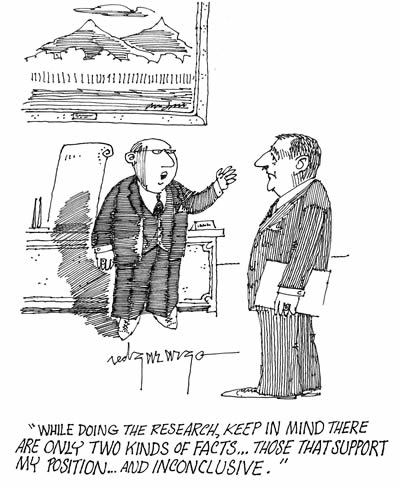Lesson 2: Psychological Research
Attention

Learning Outcomes
Upon completion of this lesson's material, students will be able to:
- Discuss the impact of personal preference matching and attribution theory on the ability to accurately assess data.
- Explore the evidence related to a common myth in Psychology.
Teaching
Asking Questions
Although Psychology got its start in the field of Philosophy, modern Psychologists utilize the scientific method to pursue research questions much the same way other scientists (biologists, astronomers, and physicists) seek answers to their questions.
As humans we are naturally inclined to ask questions about our own and others' behavior. In fact, to successfully navigate this class you need to nurture a curiosity about why people act the way they do! What makes people tick!
The Scientific Method
Outside of the field of Psychology way may rely on our own experiences and perceptions to answer our questions about behavior. However, we already know from Lesson 1 that we have biases that shape they way we perceive and interpret the world. We can come up with answers that seem correct to ourselves, but that does not mean they are right!
To move our inquiry into the world of science our research needs to have a "method"...we call this the "Scientific Method" Here is a short video explaining the Scientific Method.
Methods of Scientific Inquiry in the field of Psychology
Your book does an amazing job of explaining each of the major ways in which we explore our questions in this field.
- Clinical or Case Studies
- Naturalistic Observations
- Surveys
- Archival Research
- Longitudinal and Cross-sectional Research
- Correlation Research
- Experiments
Psychological Literature
We refer to the broad collection of all of this published work in the field of Psychology as the "Psychological Literature" or simply, the "Literature." This information is published in special magazines (journals) that are rarely available at your local bookstore! These journals are written for other professionals in the field and are formatted in very specific ways and assume a high degree of specific knowledge in the field. These sources are called "Peer Reviewed" because they have been reviewed by other Psychologists and have been found to be valid and reliable sources of information.
You can find a journal for just about any topic you are deeply interested in.
In this course you have an assignment to do a Research Project. In TRUTH you will not be conducting any specific research using the whole scientific method described earlier. You ARE going to be constructing a question and finding information in the Literature to answer these questions.
Details on how to access these sources using our Library services are outlined in the Research Project assignment.
Evaluating Sources of Information
In our age we are continually bombarded with information. We are, essentially, consumers of information...but just as we need to watch what we eat when it comes to food, we have to watch what we eat when it comes to information. We need to continually be on the watch for poor and bad information. One way that we do this is by evaluating our sources.
When we are processing information that we encounter, we filter it through our brains. While our brains are really good at this they are also full of bias, expectations, assumptions, beliefs, personal experiences, and prejudices that shape how we process information. It is important for us to minimize the impact of these aspects of our minds as we encounter information. EVERYONE has biases...the important thing is to know what they are and how to minimize their impact your ability to process information effectively.
When we read or hear information we need to ask some very specific questions as we determine if we are going to believe what we are hearing:
- Is the person who is talking a credible expert on the topic? What do they have that gives them expertise?
- Is the source simply sharing information or is it trying to get me to agree or buy something?
- Is the data collection methodology explained and does it follow scientific standards?
- Are the statistical methods appropriate for the kind of information being presented?
- Is the research being supported by a third party that may influence the results?
We need to continually ask these question in order to be good critical thinkers.
Click HERE to visit the Purdue University Online Writing Lab section on "Evaluating Sources of Information"
"Even the Elect will be Deceived"
Over the years a lot of "bad" research has been put out there. A lot of these studies have made broad claims about human behavior and the nature of the mind that are simply unsupported. However, the ideas seemed to have caught on and have become "Myths" associated with the field of Psychology.
Click HERE to view a very lengthy examination of the 50 Great Myths of Popular Psychology.
Assessment
In this section you will find a list of the required Assessments that accompany this Lesson. The Lesson Discussions are designed for the ONLINE and HYBRID versions of this course. If you are not in an ONLINE or HYBRID version of this course you can ignore these instructions unless otherwise guided by your instructor.
Lesson 2 Discussion
Consider the content in this Lesson regarding our biases. What are your biases? They would be based on your race, gender, upbringing, political affiliation, education, experiences, etc. Share some of your own biases and explain how they impact the way you experience the world. Remember, the key is not to deny that you have any biases, but to be able to contend with them.
Lesson 2 Quiz
- Select one of the Myths that is described in the "50 Great Myths of Popular Psychology" Write a brief essay outlining the argument presented by the author.
- Describe how the author's presentation questions the various sources of information.